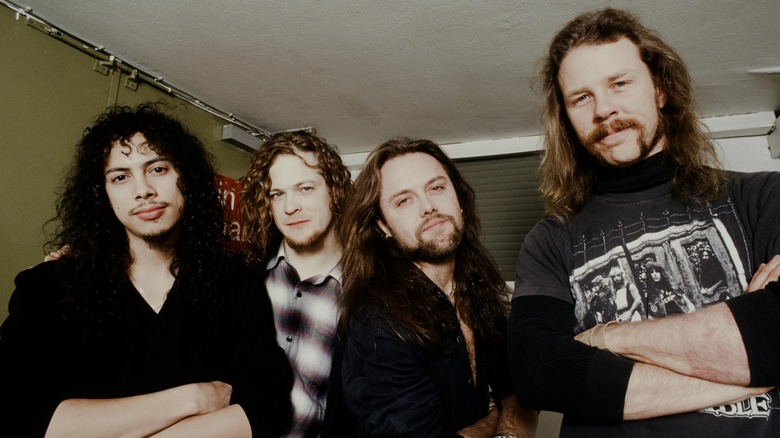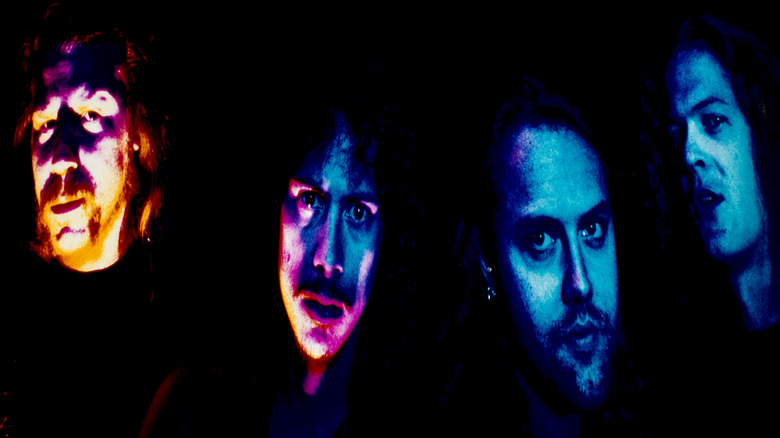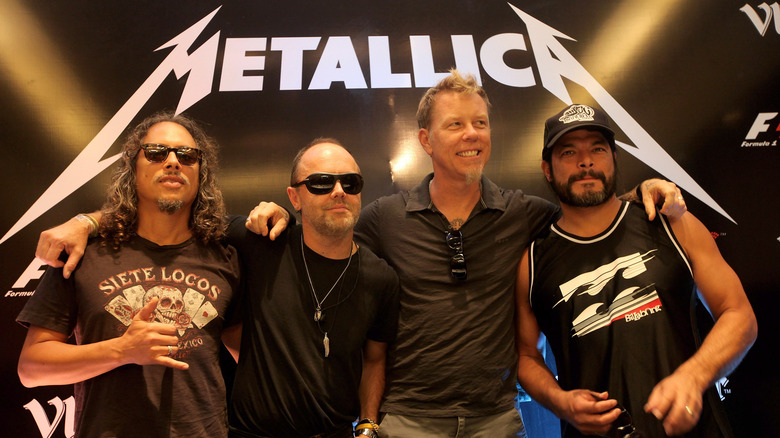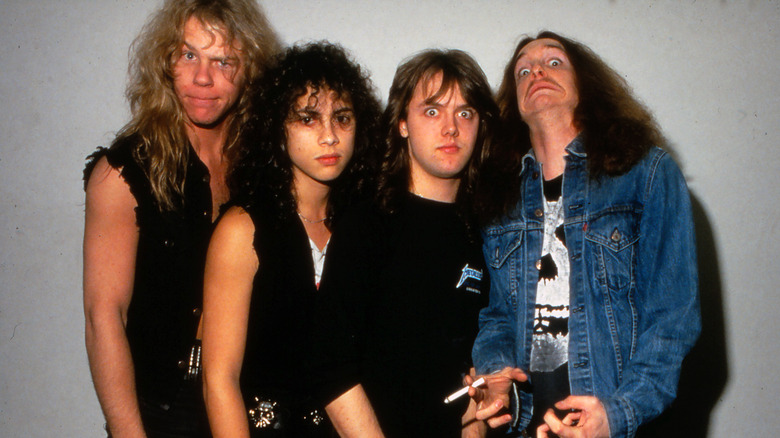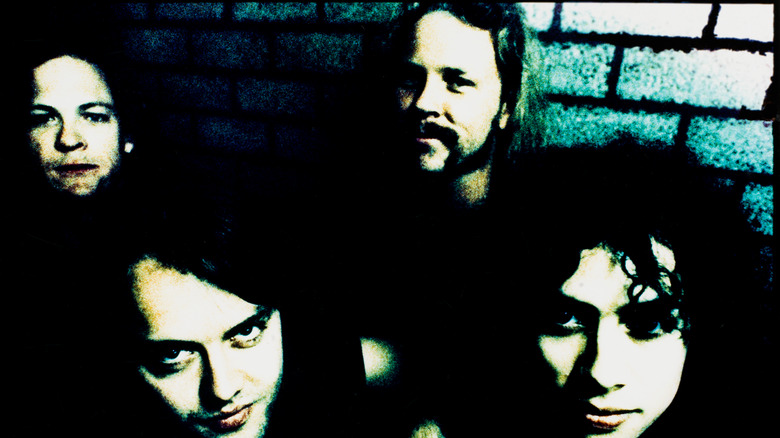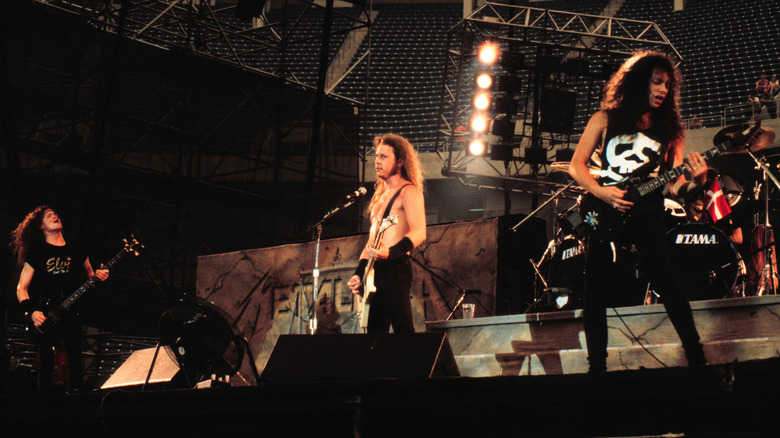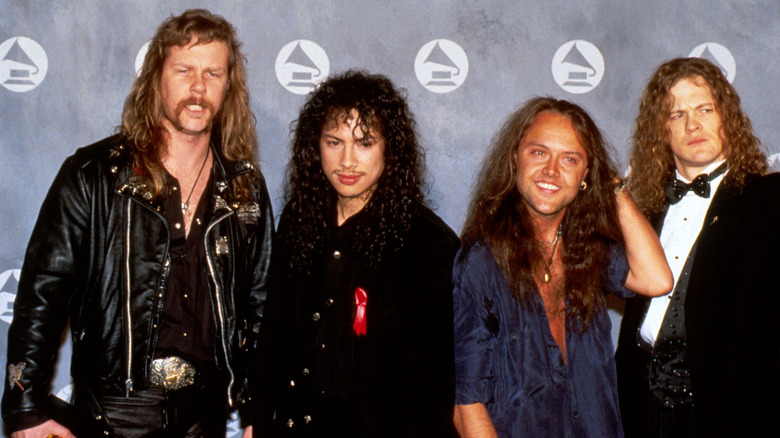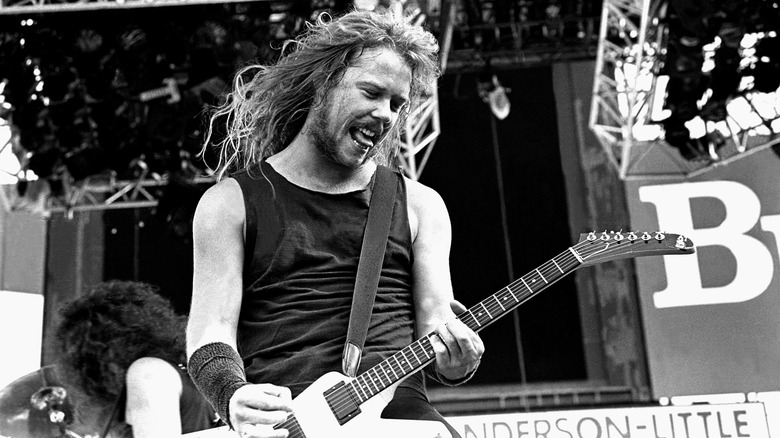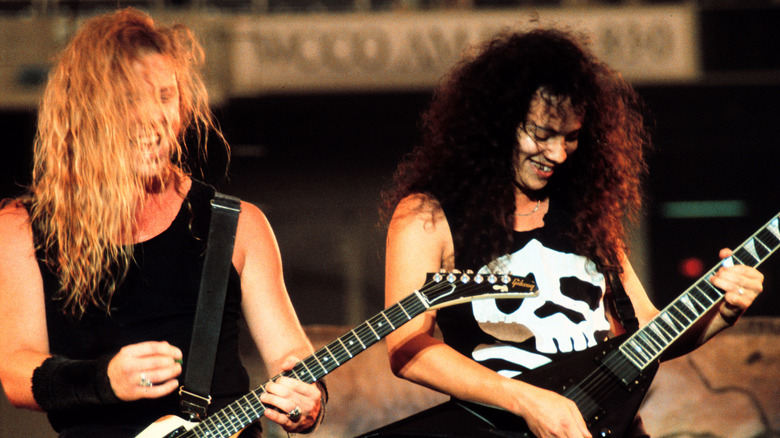The True Stories Behind These Metallica Songs
When you think of metal music, a few key influential bands immediately come to mind. Judas Priest. Motörhead. Iron Maiden. And, of course, Metallica. The heavy, in-your-face, and über-talented group was formed in Los Angeles in 1981 by frontman and guitarist James Hetfield and drummer Lars Ulrich (via Metallica.com). The band that started as a simple callout in a newspaper ad turned into one of the best-selling music acts in the U.S., selling more than 120 million records across the globe over their decades-long tenure. Their success isn't purely commercial, either — they've earned eight Grammys and received an impressive 18 Grammy nods throughout their career.
Metallica are gods in the metal genre, and albums like 1984's "Ride the Lightning" and their 1991 self-titled album (also known as "The Black Album") are considered highly influential pieces in metal history. Standout songs like "One," "Master of Puppets," and "Enter Sandman" brought their sound to the masses, but the band has a plethora of songs that spotlight their genius and versatility. And these songs have some very interesting (and very personal) stories behind them. From tales of family tribulations to an odd story from an outlaw country legend, these are the true stories behind the creation of these iconic Metallica songs.
Master of Puppets
Spoiler warning: This article contains spoilers for "Stranger Things" Season 4.
This classic Metallica tune got some major love recently thanks to its feature in a little show called "Stranger Things." According to Variety, the Season 4 finale shows beloved new weirdo Eddie Munson playing "Master of Puppets" on guitar as a distraction for his pals — a distraction that ultimately leads to his death by Upside Down bats. Variety reports that the Duffer Brothers (the creators of "Stranger Things") thought the song was a "clear choice" for the epic shred scene. Make no mistake, though — the guitar-heavy song was a hit for Metallica long before the Upside Down existed. According to Songfacts, it's the most popular live song for the band, and Metal Hammer put it at the top spot on the list of best Metallica songs ever.
But what exactly is this resurfaced Metallica staple about? As Songfacts notes, it's about way more than a puppet and its master — it's about drugs. Specifically, it's about how they can control every aspect of your life. Rolling Stone reports that Hetfield wrote it after seeing people use drugs at a San Francisco party — a sight that he said made him sick. Lyrics like "Taste me and you will see/ More is all you need" take on a whole new meaning now, don't they?
Enter Sandman
"Enter Sandman" is one of Metallica's most iconic songs to date and one of the most popular metal songs ever (via Far Out Magazine). It hit No. 16 on the Billboard Hot 100 chart in 1991, exposing the band's gritty and heavy sound to the mainstream. Looking at the tune's title and lyrics, you may think it was always meant to be crafted as a song about the boogeyman and childhood nightmares. However, the metal song's original lyrics were about something much, much sadder.
As Uncut reports, Hetfield originally wrote "Enter Sandman" to be about crib death. Now, Metallica are known for their heavier and darker music, but this topic was too heavy for the band and their producer Bob Rock. Rock talked to Hetfield about changing the song's lyrics, and as such, the beloved song about a creature terrorizing children in their slumber came to be.
One
From the minute you hear the hauntingly beautiful opening notes of "One," you know you're listening to an epic metal classic. The build up, the riffs, the breakdown ... it's all a testament to Metallica's talent and genius. There's a reason the song earned the band their first Grammy, after all. Yes, the playing is phenomenal, but the story Hetfield sings is downright horrific once you really listen to it.
According to Louder, the song is about a soldier who loses his limbs and senses (sight, hearing, etc.) during war — but remains conscious. He's essentially trapped in a brutal state of existence, unable to do anything. Hetfield drew inspiration for "One" from Dalton Trumbo's 1939 book "Johnny Got His Gun," a story that tells the story of that soldier and highlights the atrocities of war. At its core, "One" is very much an anti-war song that echos Trumbo's main themes: war is hell, and its effects go beyond the battlefield (via Far Out Magazine). You can even see clips from the 1971 "Johnny Got His Gun" movie (based on Trumbo's book) in the song's music video. Seeing the grim story unfold as Metallica plays is chilling, but eye-opening.
For Whom the Bell Tolls
Those opening bell chimes really set the stage for this powerful Metallica song. "For Whom the Bell Tolls," off the band's legendary album "Ride the Lightning," is another in-your-face tune that has a compelling message behind it. According to Songfacts, it's about the pointlessness of war. The song is named after (and based on) Ernest Hemingway's 1940 novel about an American fighting in the Spanish Civil War. With lyrics like "For a hill men would kill, why? They do not know / Stiffened wounds test there their pride," it's pretty clear to listeners that the concept of war is being questioned.
William Irwin echos this point in his book "The Meaning of Metallica: Ride the Lyrics." He explains that the song tasks us to really think about the concept of war and if it's worth all the physical and mental scars it causes. Definitely a heavy topic for a heavy song, but Metallica is known for bringing more somber topics to mainstream consciousness through their music.
Mama Said
Metallica's "Mama Said" is arguably the most personal song on their 1996 album "Loud" (via Discogs). According to Songfacts, it's about the relationship James Hetfield had with his mother, Cynthia Hetfield, who died of cancer when he was a teenager. Specifically, it talks about the regrets of a son not spending enough time with his mother and all the questions that he would never have the answers to. Lyrics like "Never I ask of you, but never I gave/But you gave me your emptiness/I now take to my grave" really emphasize Hetfield's grief in the country-rock ballad.
What makes the song even heavier is the circumstances surrounding Cynthia's death. According to "Birth School Metallica Death" by Paul Brannigan and Ian Winwood, Cynthia's health was declining for some time, but she refused medical treatment due to her Christian Scientist beliefs. As such, all Hetfield and his family could do was watch their mother succumb to the disease.
Nothing Else Matters
Now, Metallica's known for their guitar-thrashing, head-banging-inducing songs, but make no mistake — they can be sentimental when they want to be. Take "Nothing Else Matters," an epic ballad from their 1991 self-titled album commonly known as "The Black Album." The song slowed things down a bit for the band, getting as tender as a metal ballad can get. And, turns out, it was written for a pretty sweet reason.
As Metal Hammer reports, James Hetfield wrote the song because he was homesick and missing his then-girlfriend while on the road. It was different from what Metallica was used to producing, and, as such, Hetfield wasn't thrilled to show the demo to his bandmates (via Ultimate Classic Rock). However, the other Metallica members, especially Lars Ulrich, liked the change of pace. Sure, the song doesn't provide commentary on the horrors of war, but it showed that Metallica had some versatility to them — both in songwriting and composition. It saw some mainstream success, too, hitting No. 11 on the Billboard Mainstream Rock chart in 1992.
The Unforgiven
You can hear the heavy emotion flowing in "The Unforgiven," another Metallica ballad that has deeply personal roots for James Hetfield. According to Songfacts, Hetfield, Lars Ulrich, and Kirk Hammett wrote the tune, which has a softer, more emotional sound compared to the band's other music. Part of the reason it's so emotional is that the lyrics are inspired by Hetfield's boyhood (via Ultimate Classic Rock). He drew inspiration from his parents' very strict religious beliefs, their divorce, and other aspects of his upbringing for the song — and you can really hear the pain in his voice.
Hetfield didn't just solely draw vocal inspiration from his painful past, though. According to Ultimate Classic Rock, he was inspired to try a new vocal style after hearing Chris Isaak's song "Wicked Game." His performance and the song's lyrics resonated with audiences — it reached the No. 10 spot on the Billboard Mainstream Rock chart in 1991. Not bad for an emotion-packed metal ballad.
Creeping Death
"Thrashing" and "biblical" aren't two words you see together often, but that's exactly how to describe Metallica's song "Creeping Death" off of "Ride the Lightning." According to Songfacts, the song is about Moses' life and one of the plagues brought down on Ancient Egypt in the Book of Exodus. Specifically, "Creeping Death" refers to the fog — also known as the angel of death — taking the lives of the firstborn kids and animals (via Ultimate Classic Rock).
So, what inspired Metallica to take the religious route for this song? According to Metal Hammer, it came from the 1956 epic film "The Ten Commandments," which Lars Ulrich admitted to being "obsessed with" as a child. Ulrich, along with James Hetfield and late bassist Cliff Burton, watched the film while composing the song and used it as inspiration for the lyrics. Bonus fun fact: When thinking about that killer plague, Burton was the one who thought "creeping death" was the perfect way to describe it. Clearly, the band agreed.
Ride the Lightning
Metallica's album "Ride the Lightning" has some staple songs on it, including "Fade to Black" and "For Whom the Bell Tolls." Another classic Metallica song on the album? "Ride the Lightning" (yep, the tune has the same name as the album). In true Metallica fashion, the song brought a heavier topic to the mainstream: the death penalty. According to Metal Hammer, the song is about a death row inmate facing the electric chair. Lars Ulrich explains that, specifically, it highlights the inevitability of facing your maker.
Let's be clear here: "Metallica: The Stories Behind the Biggest Songs" by Chris Ingham rightfully points out that Metallica isn't necessarily taking a stance on the death penalty in this song. They simply paint a vivid picture of a man about to meet his end via electric chair and let listeners debate the morality themselves, which is just as powerful.
Escape
"Ride the Lightning" is considered by many to be a classic metal album, so it's hard to believe that there's a song on it that Metallica isn't too keen on. But there is. In an interview with Sopitas, James Hetfield explained that "Escape" was written and recorded very quickly after the label wanted one more song for "Ride the Lightning" — an album the band thought was all set. So, in a rush, they recorded "Escape" and weren't thrilled with it. According to Far Out Magazine, the band didn't want the song on the album, but their hands were tied, and the label got their wish for another song.
So, did Metallica warm up to the song over time? Not exactly. According to Far Out Magazine, the band didn't play the song live until 2012's Orion Festival — a whopping 28 years after its recording. In an interview with Rolling Stone, guitarist Kirk Hammett admitted it's not the best song for Metallica to play live ... so we'll see if the band ever plays it live again.
The God That Failed
James Hetfield wasn't shy about writing Metallica songs that were inspired by his life and his family. "The God That Failed" off of "The Black Album" is another personal song about the death of his mother — but, as "Metallica: The Stories Behind the Biggest Songs" points out, this one channeled the anger he felt about her passing.
In an interview with Playboy, Hetfield explained that growing up in a Christian Scientist household was "alienating and hard to understand." What was even harder to understand was his parents' stance on medical treatment — specifically, according to Hetfield, that God would fix your ailments and you didn't need doctors as long as you had faith. So, you can see how the anger over his mother's death from cancer festered. According to "Metallica: The Stories Behind the Biggest Songs," Hetfield believed that had his mother sought traditional medical treatment, her fate may have been different. You can hear the anger in the lyrics to "The God That Failed," which include "Broken is the promise, betrayal / The healing hand held back by the deepened nail / Follow the god that failed."
Wasting My Hate
When people think of Metallica, they think of metal — not country. The two genres have stark differences, both in sound and in content, but that didn't stop James Hetfield from writing a song inspired by a country icon. According to Rolling Stone, James Hetfield met Waylon Jennings during a college radio event, and the two struck up a friendship. Of course, friends swap stories, and it was a story Jennings recounted to Hetfield that inspired "Wasting My Hate."
Now, there are two similar versions of Jennings' tale. According to "Metallica: The Stories Behind the Biggest Songs," Jennings told Hetfield a story about him being out to eat when, suddenly, he noticed a man outside in a car intently staring at him. So, Jennings stared back angrily and became irritated when this person wouldn't stop staring. After a while, Jennings went out to confront the man, only to realize the guy wasn't staring at all — he was sleeping. According to Songfacts, another version slightly alters the scene. In this version, Jennings was at a bar in Jamaica when he noticed that a local wouldn't stop staring at him. This really ticked Jennings off, but he later found out the local wasn't staring so intently on purpose — they were just high. Both accounts have the same theme, though: Jennings wasted his hate on people who didn't deserve it, and that stuck with Hetfield.
